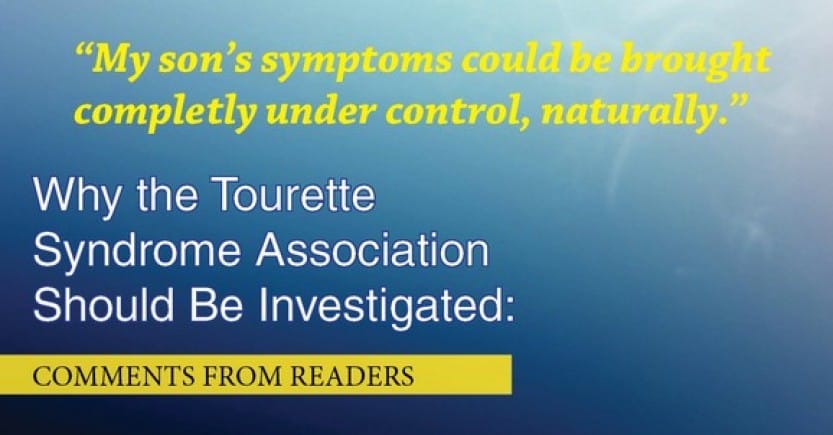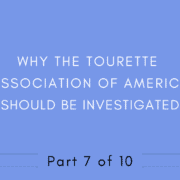A Doctor Finds Answers for His Son’s Tourette Syndrome
This comment was written by Dr. Daniel Fuks in response to Why the Tourette Syndrome Association Should Be Investigated: Part One. A second comment by Marne Glaser follows.
I am a cardiac surgeon and I have a 14-year-old son. When he was four he was diagnosed with severe Tourette syndrome. His symptoms improved slowly with antidepressant medication and beta blockers.
I began investigating the subject and reading the latest international literature. I was determined to use natural treatments rather than give him psychiatric medication like Orap.
I must thank Sheila Rogers and Dr. William Shaw, who have been my literary guides with their books Natural Treatments for Tics and Tourettes and Biological Treatments for Autism respectively. I also learned a great deal about inflammation and candida, and found the book by Paul Pitchford, Healing with Whole Food, very useful.
Once we began to implement lessons from these sources, the health of the whole family began to improve, beginning with my son.
I must say that with our efforts I was finally able to work ourselves out of this enigmatic maze. We found that my son’s symptoms could be brought completely under control when avoiding all the identified allergens along with a strict diet, free from gluten and associated products and dairy products which were triggers for him. He receives orthomolecular supplements of magnesium.
If he indulges in a food he should not eat, his symptoms start to return. When back on his diet, they are gone.
It is a pity that an institution like the Tourette Syndrome Association is now under suspicion for having other interests that appear to have little to do with the health of our children.
Marne Glaser in response to Part Two.
The phenomenon you are describing, Sheila, is being played out over and over in multitudinous fields, in so many “expert” associations and agencies that people rely on. My first advice to readers—don’t automatically assume any expert group is truly expert, or more pointedly, that any expert group is operating without conflicts of interest. So many are, over time, cozied in with related industries who rely on certain “truths” to the exclusion of others. Those “truths” invariably keep the stream of money flowing for them, at the expense of the very people and causes they are supposed to serve. It’s a hard reality. But it’s so. It is so very so.
TSA may do some good, but it sounds like they are doing a lot of ungood along the way by closing themselves to other possibilities (which invariably leads to besmirching other “outside”researchers). Same thing with the American Cancer Society (and unfortunately, many of our federal agencies). Prevention and environmental approaches just aren’t lucrative like drugs and expensive therapies are. Why research prevention or solving the problems naturally when you and the pharmaceuticals, etc., can keep a good thing going. Pink ribbons, whoopdidoo, but don’t look at environmental causes that might lead to a dent in some industry’s bottom line. It’s cynical, but it happens. All too often, it happens. Something quirky in the human wiring. Good people slowly transform into the “three monkeys” who will not see anything, will not hear anything, and will not say anything that disturbs the company line, or bites the hand that feeds. Their truthiness bounces around in a hall of mirrors. They get their approval by staying a well-behaved part of that group. How do they sleep at night? Apparently very well.









